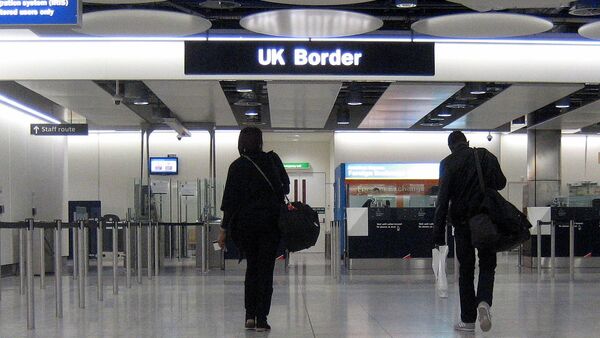Sputnik has discussed the issue with Philip Ingram, a former British senior intelligence and security officer.
Sputnik: British jihadists who travel to Syria will face up to ten years imprisonment. How, do you think, this plan may be implemented in practice?
Philip Ingram: This plan is merely closing a loophole in previous legislation now covered in the latest counterterrorism bill, that allowed individuals to travel to banned parts of the world where their only motivation is to participate in illegal activities but avoid prosecution.
It will serve as an increased deterrent for those thinking of traveling to proscribed locations as they will know before departure that they are committing an offense that can carry a long jail sentence.
Philip Ingram: The authorities shouldn’t face any real obstacles as this has been debated and has broad support across the house of parliament.
However, in the current climate, if an opposition party finds an opportunity to use it to try and cause damage to the government, I am sure they will try!
Sputnik: Is there enough technical tools to trace everybody going to Syria and remaining there?
Philip Ingram: There are enough technical tools to trace individuals on known routes into Syria and elsewhere but this will rely on more than just technical tools.
International cooperation, intelligence and more will be used to monitor any potential lawbreakers.
Sputnik: The Act is designed to allow the authorities to prosecute individuals, even when there is limited evidence of a suspect’s activities abroad. How do you assess the law from the legal point of view?
Philip Ingram: I am not a lawyer or legal expert, but one thing is guaranteed, there are enough freedom of expression organisations that you can guarantee they will fund a challenge to the first use of this law if they get the chance, so it will be tested in court and if the European Human Rights Act still applies, I would expect it to be challenged in Europe too.
Philip Ingram: I don’t think this is a statement designed to show the strength of one party or of Mr Javid as a possible leadership contender for the Conservative Party.
It is appropriate that it is made, he is the person who should make it and the timing is right after the introduction of the new anti-terror legislation.
Sputnik: What can be the society's reaction?
Philip Ingram: I think on the whole, society supports any actions aimed at keeping us safer, so I don’t think there will be significant adverse comment.
Sputnik: Around 900 Britons are believed to have travelled to Syria or Iraq. What can be the authorities' next steps against them? What has been done so far?
Philip Ingram: Approximately 900 have travelled to Iraq and Syria, about 425 – 450 have returned and a couple of hundred have been killed. The rest are being monitored where possible in the camps they are in or are currently unaccounted for.
The UK Security Services and Counter Terror Police currently have 700 active investigations with 3000 people being monitored and another 20,000 on a terror database. This is a huge task.
Views and opinions expressed in this article are those of Philip Ingram and do not necessarily reflect those of Sputnik.



